Comprehensive Analysis: Great Chartered Accountant Company Overview
VerifiedAdded on 2022/10/17
|10
|2411
|9
Report
AI Summary
This report presents a detailed analysis of the Great Chartered Accountant Company, examining its internal environment, including its small size, employee structure, and the advantages and disadvantages associated with these characteristics. It explores the external environment, focusing on recent trends in the accountancy sector, such as the hiring of a diversified workforce and the impact of government policies and technological advancements. The report also defines and explains key concepts like Corporate Social Responsibility, Ethics in Business, Sustainability, and Globalization, providing relevant examples. Furthermore, it investigates the impact of Artificial Intelligence on accounting practices and highlights the importance of ethics in the field, including the role of ethical considerations for the company and its employees. The analysis includes references to academic sources to support the findings.
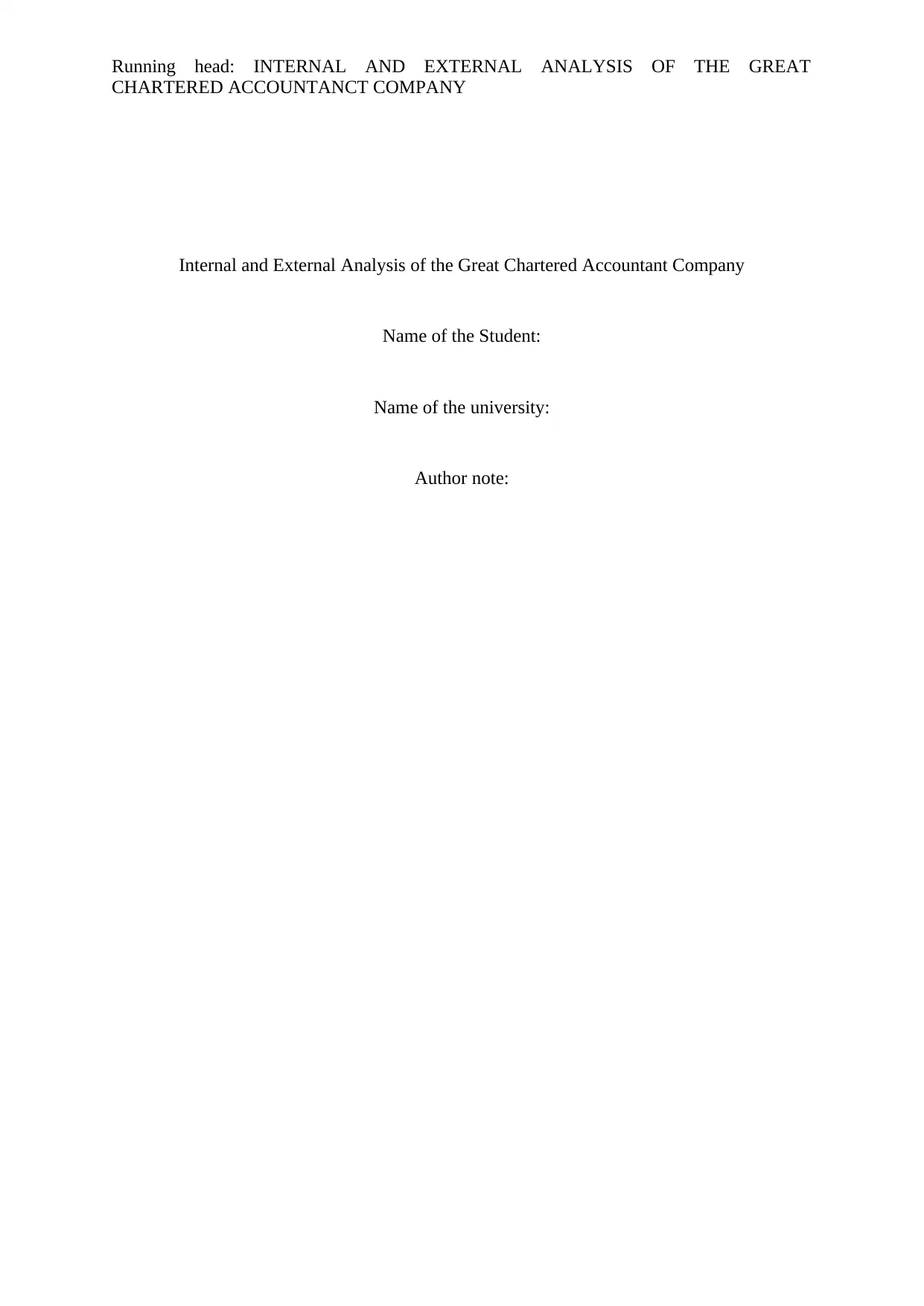
Running head: INTERNAL AND EXTERNAL ANALYSIS OF THE GREAT
CHARTERED ACCOUNTANCT COMPANY
Internal and External Analysis of the Great Chartered Accountant Company
Name of the Student:
Name of the university:
Author note:
CHARTERED ACCOUNTANCT COMPANY
Internal and External Analysis of the Great Chartered Accountant Company
Name of the Student:
Name of the university:
Author note:
Paraphrase This Document
Need a fresh take? Get an instant paraphrase of this document with our AI Paraphraser
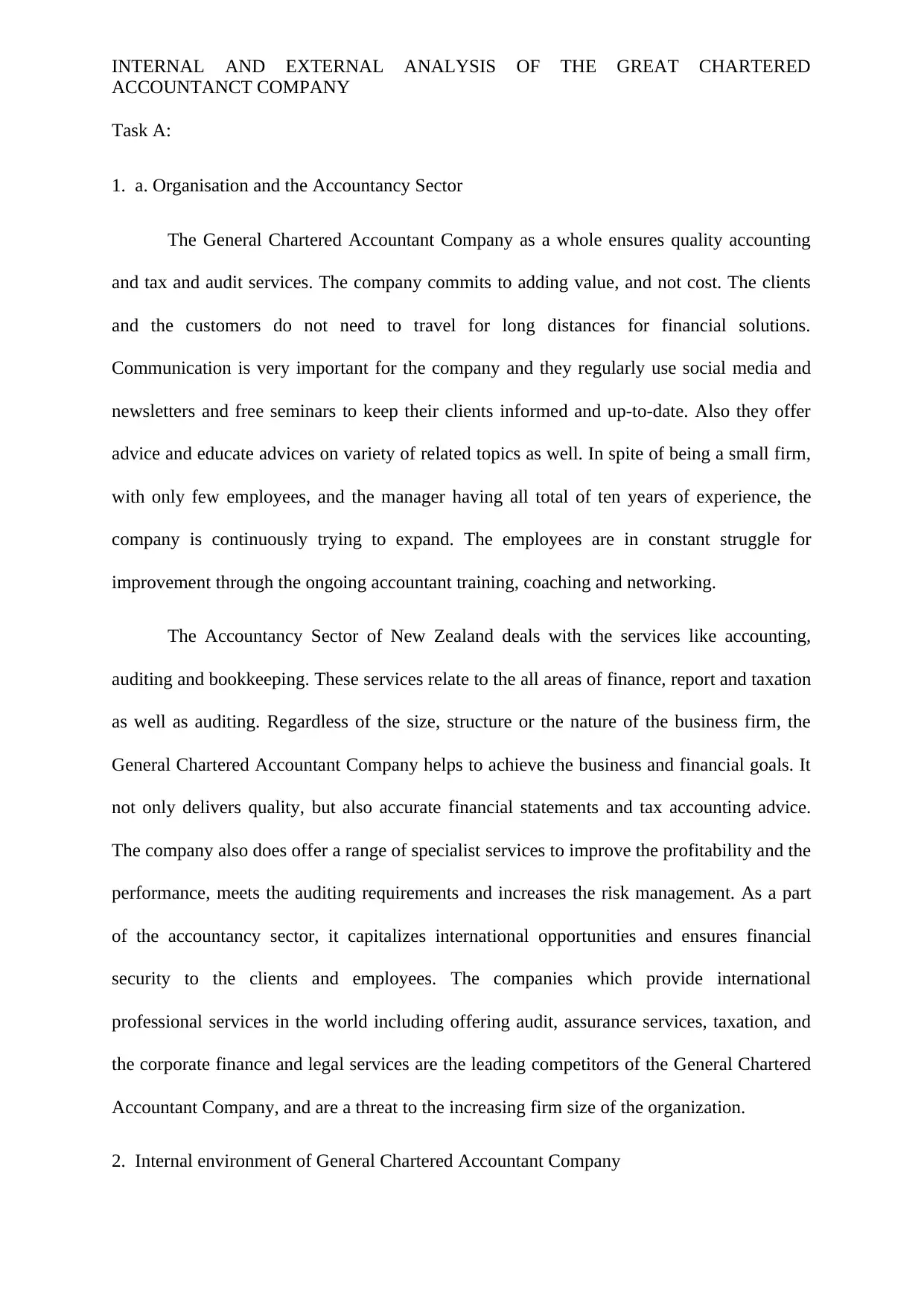
INTERNAL AND EXTERNAL ANALYSIS OF THE GREAT CHARTERED
ACCOUNTANCT COMPANY
Task A:
1. a. Organisation and the Accountancy Sector
The General Chartered Accountant Company as a whole ensures quality accounting
and tax and audit services. The company commits to adding value, and not cost. The clients
and the customers do not need to travel for long distances for financial solutions.
Communication is very important for the company and they regularly use social media and
newsletters and free seminars to keep their clients informed and up-to-date. Also they offer
advice and educate advices on variety of related topics as well. In spite of being a small firm,
with only few employees, and the manager having all total of ten years of experience, the
company is continuously trying to expand. The employees are in constant struggle for
improvement through the ongoing accountant training, coaching and networking.
The Accountancy Sector of New Zealand deals with the services like accounting,
auditing and bookkeeping. These services relate to the all areas of finance, report and taxation
as well as auditing. Regardless of the size, structure or the nature of the business firm, the
General Chartered Accountant Company helps to achieve the business and financial goals. It
not only delivers quality, but also accurate financial statements and tax accounting advice.
The company also does offer a range of specialist services to improve the profitability and the
performance, meets the auditing requirements and increases the risk management. As a part
of the accountancy sector, it capitalizes international opportunities and ensures financial
security to the clients and employees. The companies which provide international
professional services in the world including offering audit, assurance services, taxation, and
the corporate finance and legal services are the leading competitors of the General Chartered
Accountant Company, and are a threat to the increasing firm size of the organization.
2. Internal environment of General Chartered Accountant Company
ACCOUNTANCT COMPANY
Task A:
1. a. Organisation and the Accountancy Sector
The General Chartered Accountant Company as a whole ensures quality accounting
and tax and audit services. The company commits to adding value, and not cost. The clients
and the customers do not need to travel for long distances for financial solutions.
Communication is very important for the company and they regularly use social media and
newsletters and free seminars to keep their clients informed and up-to-date. Also they offer
advice and educate advices on variety of related topics as well. In spite of being a small firm,
with only few employees, and the manager having all total of ten years of experience, the
company is continuously trying to expand. The employees are in constant struggle for
improvement through the ongoing accountant training, coaching and networking.
The Accountancy Sector of New Zealand deals with the services like accounting,
auditing and bookkeeping. These services relate to the all areas of finance, report and taxation
as well as auditing. Regardless of the size, structure or the nature of the business firm, the
General Chartered Accountant Company helps to achieve the business and financial goals. It
not only delivers quality, but also accurate financial statements and tax accounting advice.
The company also does offer a range of specialist services to improve the profitability and the
performance, meets the auditing requirements and increases the risk management. As a part
of the accountancy sector, it capitalizes international opportunities and ensures financial
security to the clients and employees. The companies which provide international
professional services in the world including offering audit, assurance services, taxation, and
the corporate finance and legal services are the leading competitors of the General Chartered
Accountant Company, and are a threat to the increasing firm size of the organization.
2. Internal environment of General Chartered Accountant Company
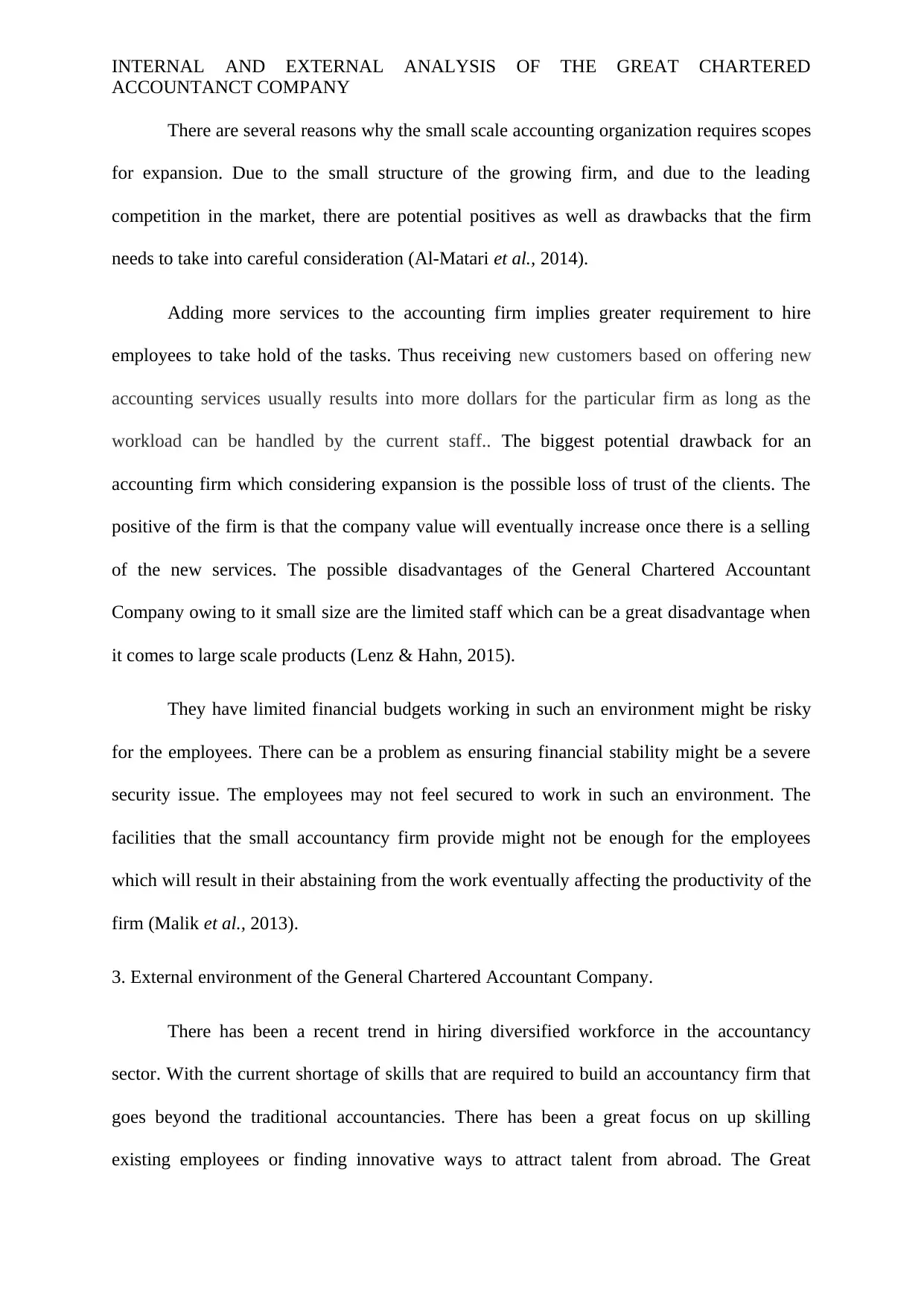
INTERNAL AND EXTERNAL ANALYSIS OF THE GREAT CHARTERED
ACCOUNTANCT COMPANY
There are several reasons why the small scale accounting organization requires scopes
for expansion. Due to the small structure of the growing firm, and due to the leading
competition in the market, there are potential positives as well as drawbacks that the firm
needs to take into careful consideration (Al-Matari et al., 2014).
Adding more services to the accounting firm implies greater requirement to hire
employees to take hold of the tasks. Thus receiving new customers based on offering new
accounting services usually results into more dollars for the particular firm as long as the
workload can be handled by the current staff.. The biggest potential drawback for an
accounting firm which considering expansion is the possible loss of trust of the clients. The
positive of the firm is that the company value will eventually increase once there is a selling
of the new services. The possible disadvantages of the General Chartered Accountant
Company owing to it small size are the limited staff which can be a great disadvantage when
it comes to large scale products (Lenz & Hahn, 2015).
They have limited financial budgets working in such an environment might be risky
for the employees. There can be a problem as ensuring financial stability might be a severe
security issue. The employees may not feel secured to work in such an environment. The
facilities that the small accountancy firm provide might not be enough for the employees
which will result in their abstaining from the work eventually affecting the productivity of the
firm (Malik et al., 2013).
3. External environment of the General Chartered Accountant Company.
There has been a recent trend in hiring diversified workforce in the accountancy
sector. With the current shortage of skills that are required to build an accountancy firm that
goes beyond the traditional accountancies. There has been a great focus on up skilling
existing employees or finding innovative ways to attract talent from abroad. The Great
ACCOUNTANCT COMPANY
There are several reasons why the small scale accounting organization requires scopes
for expansion. Due to the small structure of the growing firm, and due to the leading
competition in the market, there are potential positives as well as drawbacks that the firm
needs to take into careful consideration (Al-Matari et al., 2014).
Adding more services to the accounting firm implies greater requirement to hire
employees to take hold of the tasks. Thus receiving new customers based on offering new
accounting services usually results into more dollars for the particular firm as long as the
workload can be handled by the current staff.. The biggest potential drawback for an
accounting firm which considering expansion is the possible loss of trust of the clients. The
positive of the firm is that the company value will eventually increase once there is a selling
of the new services. The possible disadvantages of the General Chartered Accountant
Company owing to it small size are the limited staff which can be a great disadvantage when
it comes to large scale products (Lenz & Hahn, 2015).
They have limited financial budgets working in such an environment might be risky
for the employees. There can be a problem as ensuring financial stability might be a severe
security issue. The employees may not feel secured to work in such an environment. The
facilities that the small accountancy firm provide might not be enough for the employees
which will result in their abstaining from the work eventually affecting the productivity of the
firm (Malik et al., 2013).
3. External environment of the General Chartered Accountant Company.
There has been a recent trend in hiring diversified workforce in the accountancy
sector. With the current shortage of skills that are required to build an accountancy firm that
goes beyond the traditional accountancies. There has been a great focus on up skilling
existing employees or finding innovative ways to attract talent from abroad. The Great
⊘ This is a preview!⊘
Do you want full access?
Subscribe today to unlock all pages.

Trusted by 1+ million students worldwide
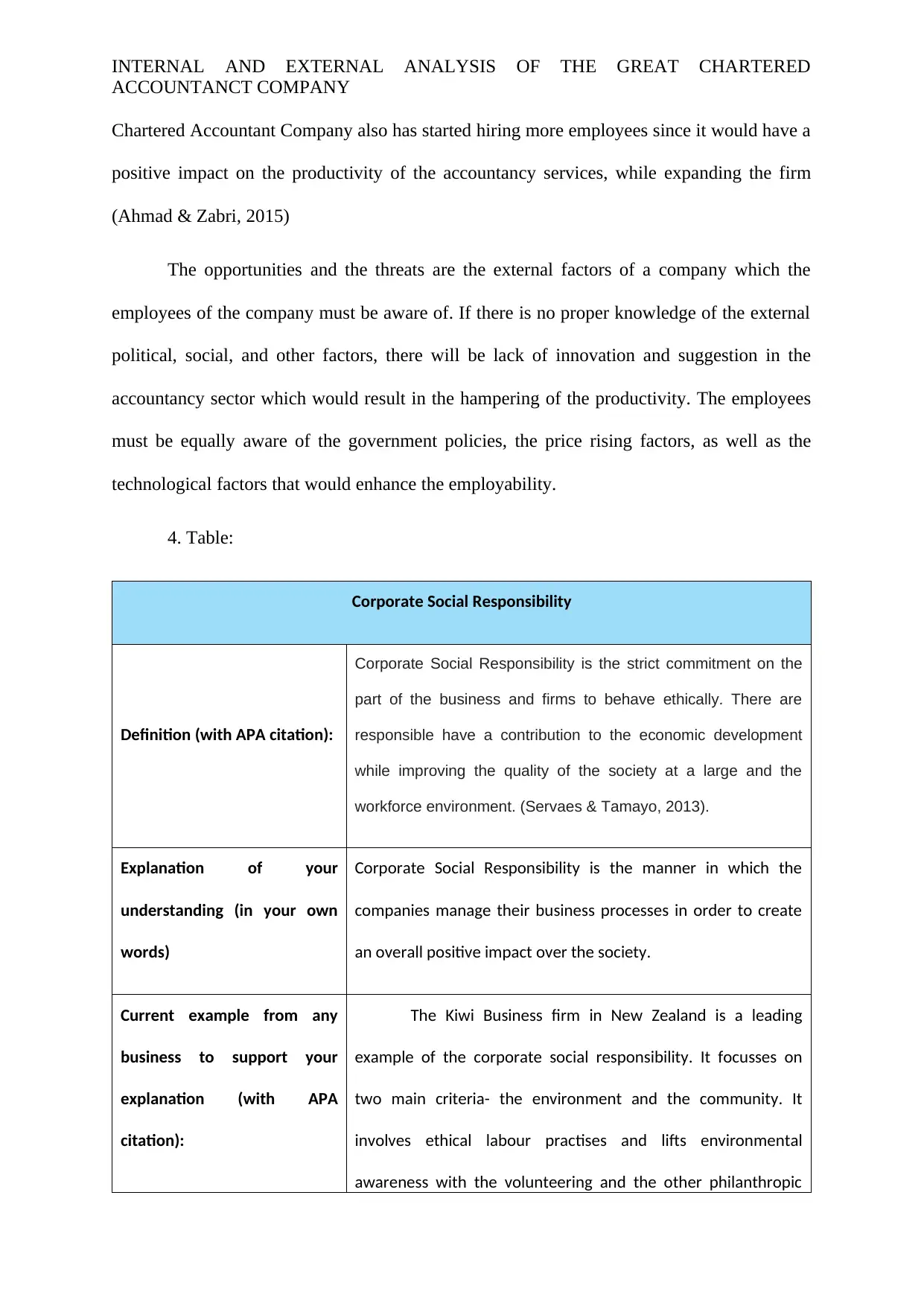
INTERNAL AND EXTERNAL ANALYSIS OF THE GREAT CHARTERED
ACCOUNTANCT COMPANY
Chartered Accountant Company also has started hiring more employees since it would have a
positive impact on the productivity of the accountancy services, while expanding the firm
(Ahmad & Zabri, 2015)
The opportunities and the threats are the external factors of a company which the
employees of the company must be aware of. If there is no proper knowledge of the external
political, social, and other factors, there will be lack of innovation and suggestion in the
accountancy sector which would result in the hampering of the productivity. The employees
must be equally aware of the government policies, the price rising factors, as well as the
technological factors that would enhance the employability.
4. Table:
Corporate Social Responsibility
Definition (with APA citation):
Corporate Social Responsibility is the strict commitment on the
part of the business and firms to behave ethically. There are
responsible have a contribution to the economic development
while improving the quality of the society at a large and the
workforce environment. (Servaes & Tamayo, 2013).
Explanation of your
understanding (in your own
words)
Corporate Social Responsibility is the manner in which the
companies manage their business processes in order to create
an overall positive impact over the society.
Current example from any
business to support your
explanation (with APA
citation):
The Kiwi Business firm in New Zealand is a leading
example of the corporate social responsibility. It focusses on
two main criteria- the environment and the community. It
involves ethical labour practises and lifts environmental
awareness with the volunteering and the other philanthropic
ACCOUNTANCT COMPANY
Chartered Accountant Company also has started hiring more employees since it would have a
positive impact on the productivity of the accountancy services, while expanding the firm
(Ahmad & Zabri, 2015)
The opportunities and the threats are the external factors of a company which the
employees of the company must be aware of. If there is no proper knowledge of the external
political, social, and other factors, there will be lack of innovation and suggestion in the
accountancy sector which would result in the hampering of the productivity. The employees
must be equally aware of the government policies, the price rising factors, as well as the
technological factors that would enhance the employability.
4. Table:
Corporate Social Responsibility
Definition (with APA citation):
Corporate Social Responsibility is the strict commitment on the
part of the business and firms to behave ethically. There are
responsible have a contribution to the economic development
while improving the quality of the society at a large and the
workforce environment. (Servaes & Tamayo, 2013).
Explanation of your
understanding (in your own
words)
Corporate Social Responsibility is the manner in which the
companies manage their business processes in order to create
an overall positive impact over the society.
Current example from any
business to support your
explanation (with APA
citation):
The Kiwi Business firm in New Zealand is a leading
example of the corporate social responsibility. It focusses on
two main criteria- the environment and the community. It
involves ethical labour practises and lifts environmental
awareness with the volunteering and the other philanthropic
Paraphrase This Document
Need a fresh take? Get an instant paraphrase of this document with our AI Paraphraser
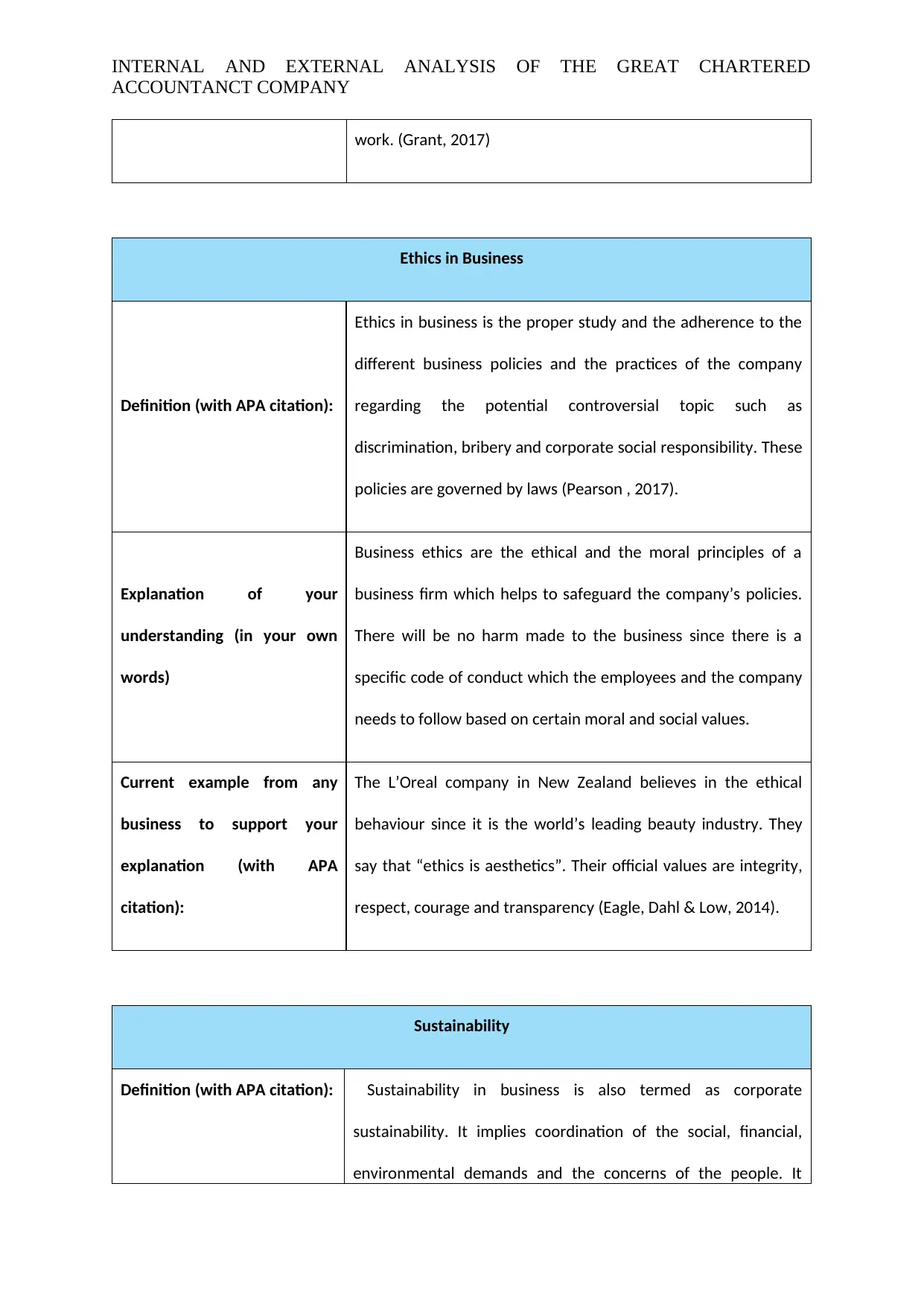
INTERNAL AND EXTERNAL ANALYSIS OF THE GREAT CHARTERED
ACCOUNTANCT COMPANY
work. (Grant, 2017)
Ethics in Business
Definition (with APA citation):
Ethics in business is the proper study and the adherence to the
different business policies and the practices of the company
regarding the potential controversial topic such as
discrimination, bribery and corporate social responsibility. These
policies are governed by laws (Pearson , 2017).
Explanation of your
understanding (in your own
words)
Business ethics are the ethical and the moral principles of a
business firm which helps to safeguard the company’s policies.
There will be no harm made to the business since there is a
specific code of conduct which the employees and the company
needs to follow based on certain moral and social values.
Current example from any
business to support your
explanation (with APA
citation):
The L’Oreal company in New Zealand believes in the ethical
behaviour since it is the world’s leading beauty industry. They
say that “ethics is aesthetics”. Their official values are integrity,
respect, courage and transparency (Eagle, Dahl & Low, 2014).
Sustainability
Definition (with APA citation): Sustainability in business is also termed as corporate
sustainability. It implies coordination of the social, financial,
environmental demands and the concerns of the people. It
ACCOUNTANCT COMPANY
work. (Grant, 2017)
Ethics in Business
Definition (with APA citation):
Ethics in business is the proper study and the adherence to the
different business policies and the practices of the company
regarding the potential controversial topic such as
discrimination, bribery and corporate social responsibility. These
policies are governed by laws (Pearson , 2017).
Explanation of your
understanding (in your own
words)
Business ethics are the ethical and the moral principles of a
business firm which helps to safeguard the company’s policies.
There will be no harm made to the business since there is a
specific code of conduct which the employees and the company
needs to follow based on certain moral and social values.
Current example from any
business to support your
explanation (with APA
citation):
The L’Oreal company in New Zealand believes in the ethical
behaviour since it is the world’s leading beauty industry. They
say that “ethics is aesthetics”. Their official values are integrity,
respect, courage and transparency (Eagle, Dahl & Low, 2014).
Sustainability
Definition (with APA citation): Sustainability in business is also termed as corporate
sustainability. It implies coordination of the social, financial,
environmental demands and the concerns of the people. It
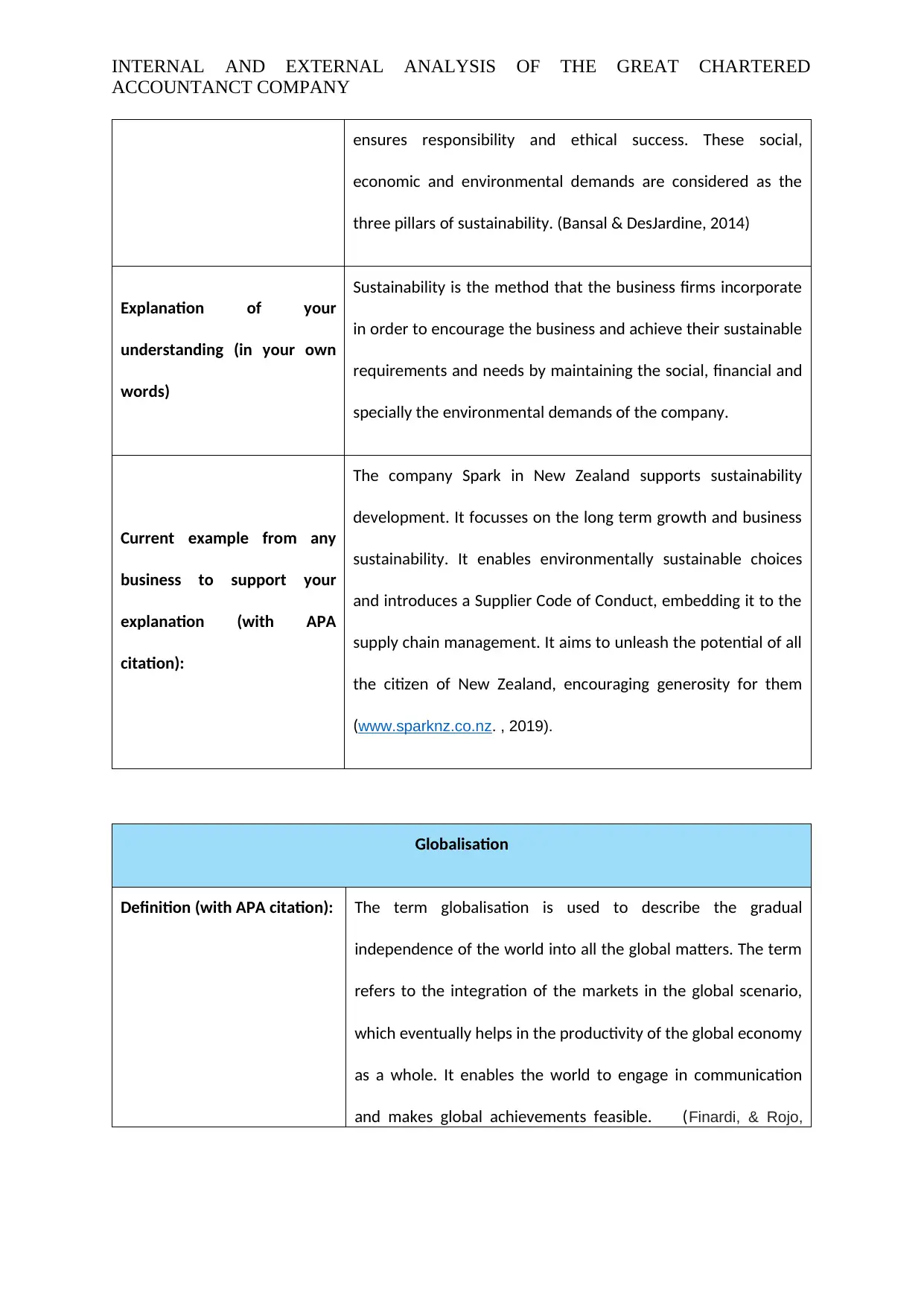
INTERNAL AND EXTERNAL ANALYSIS OF THE GREAT CHARTERED
ACCOUNTANCT COMPANY
ensures responsibility and ethical success. These social,
economic and environmental demands are considered as the
three pillars of sustainability. (Bansal & DesJardine, 2014)
Explanation of your
understanding (in your own
words)
Sustainability is the method that the business firms incorporate
in order to encourage the business and achieve their sustainable
requirements and needs by maintaining the social, financial and
specially the environmental demands of the company.
Current example from any
business to support your
explanation (with APA
citation):
The company Spark in New Zealand supports sustainability
development. It focusses on the long term growth and business
sustainability. It enables environmentally sustainable choices
and introduces a Supplier Code of Conduct, embedding it to the
supply chain management. It aims to unleash the potential of all
the citizen of New Zealand, encouraging generosity for them
(www.sparknz.co.nz. , 2019).
Globalisation
Definition (with APA citation): The term globalisation is used to describe the gradual
independence of the world into all the global matters. The term
refers to the integration of the markets in the global scenario,
which eventually helps in the productivity of the global economy
as a whole. It enables the world to engage in communication
and makes global achievements feasible. (Finardi, & Rojo,
ACCOUNTANCT COMPANY
ensures responsibility and ethical success. These social,
economic and environmental demands are considered as the
three pillars of sustainability. (Bansal & DesJardine, 2014)
Explanation of your
understanding (in your own
words)
Sustainability is the method that the business firms incorporate
in order to encourage the business and achieve their sustainable
requirements and needs by maintaining the social, financial and
specially the environmental demands of the company.
Current example from any
business to support your
explanation (with APA
citation):
The company Spark in New Zealand supports sustainability
development. It focusses on the long term growth and business
sustainability. It enables environmentally sustainable choices
and introduces a Supplier Code of Conduct, embedding it to the
supply chain management. It aims to unleash the potential of all
the citizen of New Zealand, encouraging generosity for them
(www.sparknz.co.nz. , 2019).
Globalisation
Definition (with APA citation): The term globalisation is used to describe the gradual
independence of the world into all the global matters. The term
refers to the integration of the markets in the global scenario,
which eventually helps in the productivity of the global economy
as a whole. It enables the world to engage in communication
and makes global achievements feasible. (Finardi, & Rojo,
⊘ This is a preview!⊘
Do you want full access?
Subscribe today to unlock all pages.

Trusted by 1+ million students worldwide
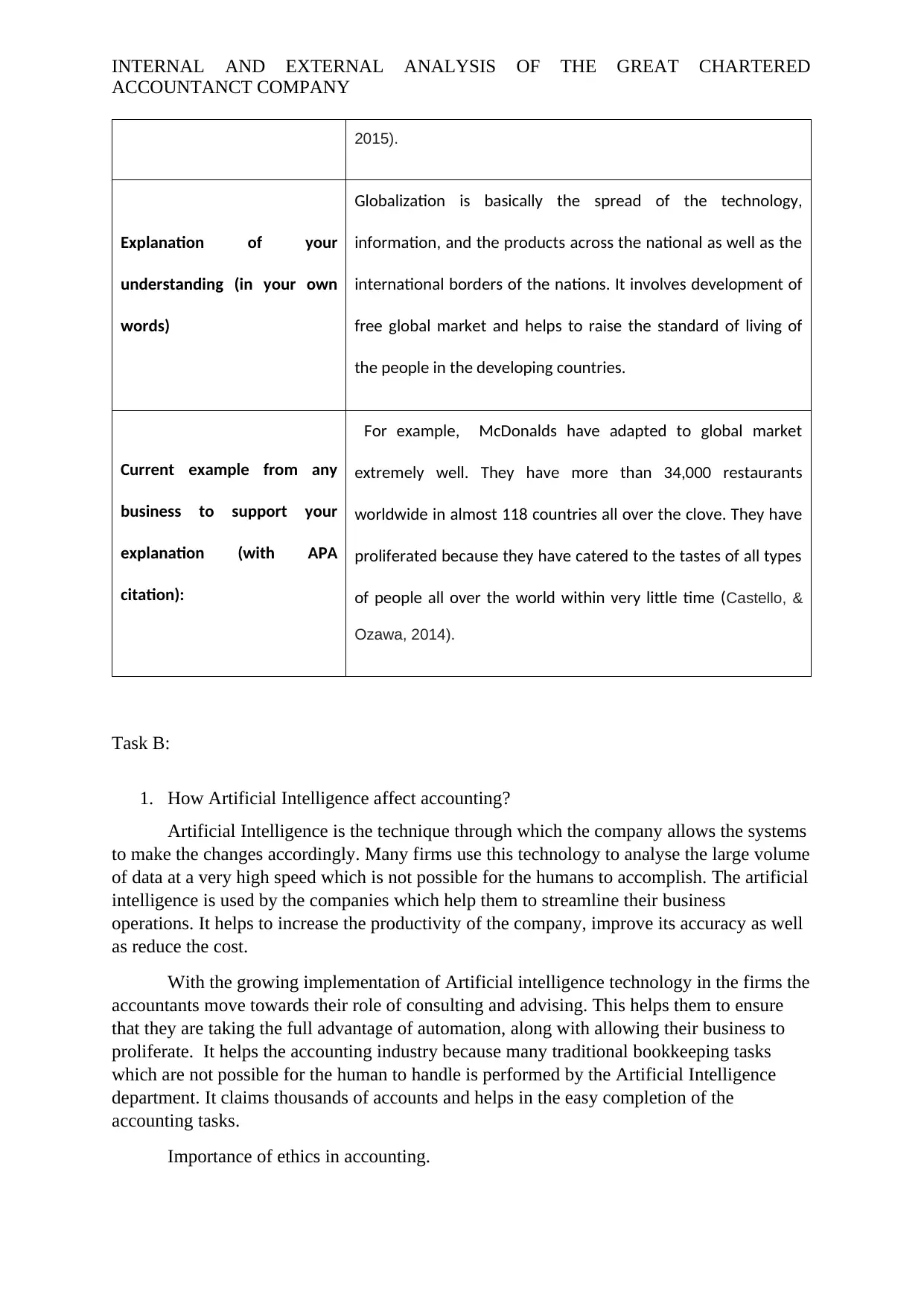
INTERNAL AND EXTERNAL ANALYSIS OF THE GREAT CHARTERED
ACCOUNTANCT COMPANY
2015).
Explanation of your
understanding (in your own
words)
Globalization is basically the spread of the technology,
information, and the products across the national as well as the
international borders of the nations. It involves development of
free global market and helps to raise the standard of living of
the people in the developing countries.
Current example from any
business to support your
explanation (with APA
citation):
For example, McDonalds have adapted to global market
extremely well. They have more than 34,000 restaurants
worldwide in almost 118 countries all over the clove. They have
proliferated because they have catered to the tastes of all types
of people all over the world within very little time (Castello, &
Ozawa, 2014).
Task B:
1. How Artificial Intelligence affect accounting?
Artificial Intelligence is the technique through which the company allows the systems
to make the changes accordingly. Many firms use this technology to analyse the large volume
of data at a very high speed which is not possible for the humans to accomplish. The artificial
intelligence is used by the companies which help them to streamline their business
operations. It helps to increase the productivity of the company, improve its accuracy as well
as reduce the cost.
With the growing implementation of Artificial intelligence technology in the firms the
accountants move towards their role of consulting and advising. This helps them to ensure
that they are taking the full advantage of automation, along with allowing their business to
proliferate. It helps the accounting industry because many traditional bookkeeping tasks
which are not possible for the human to handle is performed by the Artificial Intelligence
department. It claims thousands of accounts and helps in the easy completion of the
accounting tasks.
Importance of ethics in accounting.
ACCOUNTANCT COMPANY
2015).
Explanation of your
understanding (in your own
words)
Globalization is basically the spread of the technology,
information, and the products across the national as well as the
international borders of the nations. It involves development of
free global market and helps to raise the standard of living of
the people in the developing countries.
Current example from any
business to support your
explanation (with APA
citation):
For example, McDonalds have adapted to global market
extremely well. They have more than 34,000 restaurants
worldwide in almost 118 countries all over the clove. They have
proliferated because they have catered to the tastes of all types
of people all over the world within very little time (Castello, &
Ozawa, 2014).
Task B:
1. How Artificial Intelligence affect accounting?
Artificial Intelligence is the technique through which the company allows the systems
to make the changes accordingly. Many firms use this technology to analyse the large volume
of data at a very high speed which is not possible for the humans to accomplish. The artificial
intelligence is used by the companies which help them to streamline their business
operations. It helps to increase the productivity of the company, improve its accuracy as well
as reduce the cost.
With the growing implementation of Artificial intelligence technology in the firms the
accountants move towards their role of consulting and advising. This helps them to ensure
that they are taking the full advantage of automation, along with allowing their business to
proliferate. It helps the accounting industry because many traditional bookkeeping tasks
which are not possible for the human to handle is performed by the Artificial Intelligence
department. It claims thousands of accounts and helps in the easy completion of the
accounting tasks.
Importance of ethics in accounting.
Paraphrase This Document
Need a fresh take? Get an instant paraphrase of this document with our AI Paraphraser
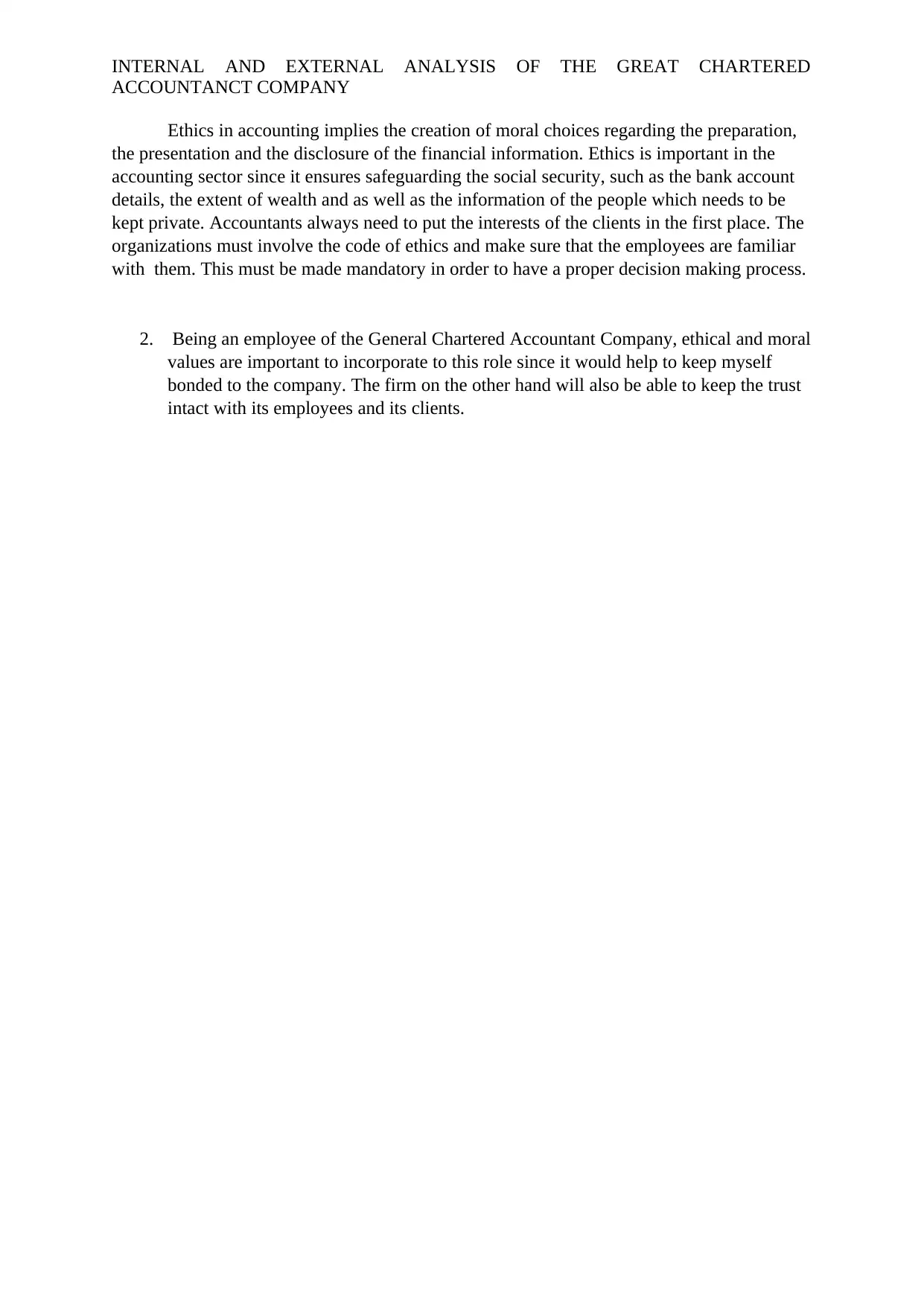
INTERNAL AND EXTERNAL ANALYSIS OF THE GREAT CHARTERED
ACCOUNTANCT COMPANY
Ethics in accounting implies the creation of moral choices regarding the preparation,
the presentation and the disclosure of the financial information. Ethics is important in the
accounting sector since it ensures safeguarding the social security, such as the bank account
details, the extent of wealth and as well as the information of the people which needs to be
kept private. Accountants always need to put the interests of the clients in the first place. The
organizations must involve the code of ethics and make sure that the employees are familiar
with them. This must be made mandatory in order to have a proper decision making process.
2. Being an employee of the General Chartered Accountant Company, ethical and moral
values are important to incorporate to this role since it would help to keep myself
bonded to the company. The firm on the other hand will also be able to keep the trust
intact with its employees and its clients.
ACCOUNTANCT COMPANY
Ethics in accounting implies the creation of moral choices regarding the preparation,
the presentation and the disclosure of the financial information. Ethics is important in the
accounting sector since it ensures safeguarding the social security, such as the bank account
details, the extent of wealth and as well as the information of the people which needs to be
kept private. Accountants always need to put the interests of the clients in the first place. The
organizations must involve the code of ethics and make sure that the employees are familiar
with them. This must be made mandatory in order to have a proper decision making process.
2. Being an employee of the General Chartered Accountant Company, ethical and moral
values are important to incorporate to this role since it would help to keep myself
bonded to the company. The firm on the other hand will also be able to keep the trust
intact with its employees and its clients.
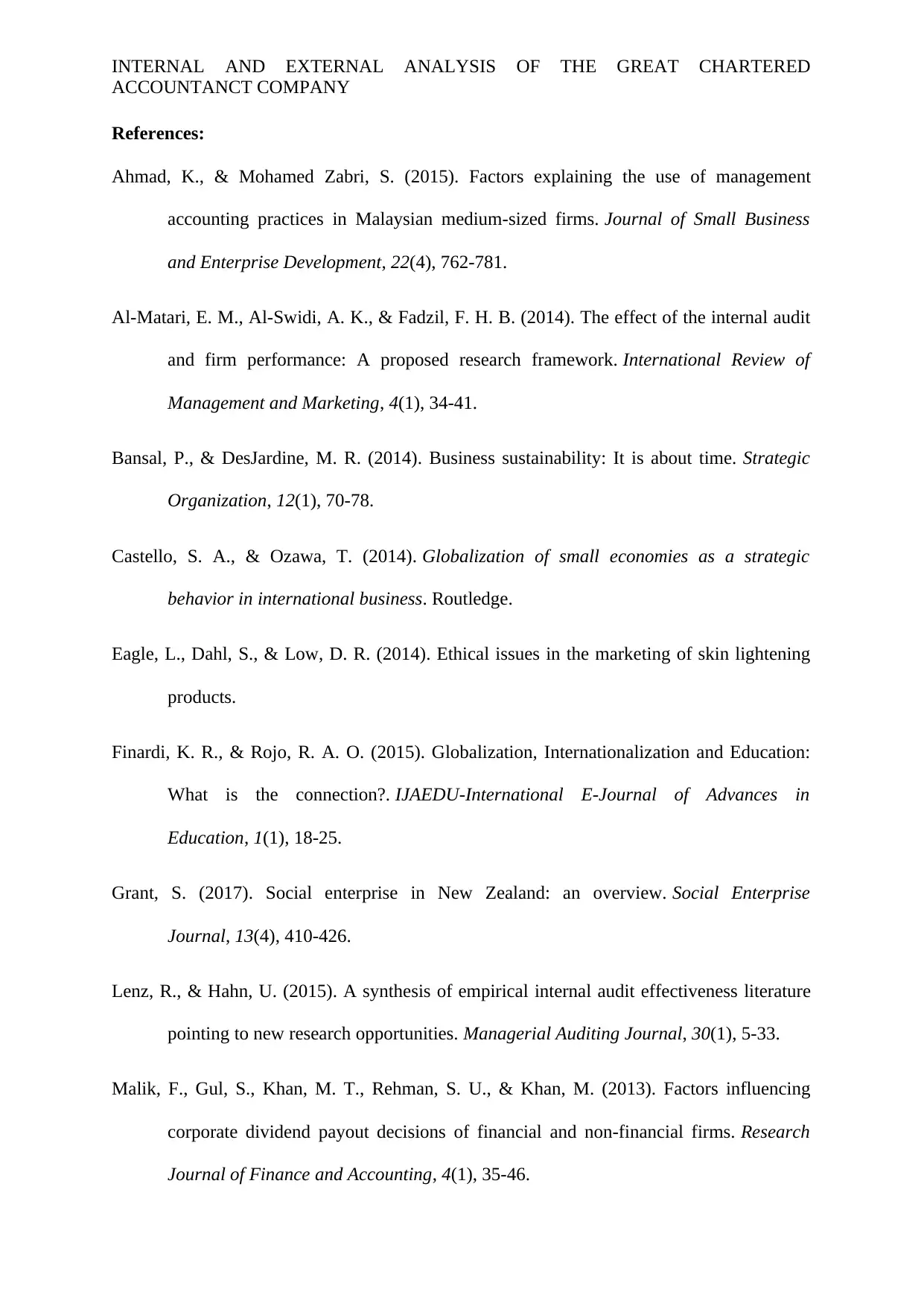
INTERNAL AND EXTERNAL ANALYSIS OF THE GREAT CHARTERED
ACCOUNTANCT COMPANY
References:
Ahmad, K., & Mohamed Zabri, S. (2015). Factors explaining the use of management
accounting practices in Malaysian medium-sized firms. Journal of Small Business
and Enterprise Development, 22(4), 762-781.
Al-Matari, E. M., Al-Swidi, A. K., & Fadzil, F. H. B. (2014). The effect of the internal audit
and firm performance: A proposed research framework. International Review of
Management and Marketing, 4(1), 34-41.
Bansal, P., & DesJardine, M. R. (2014). Business sustainability: It is about time. Strategic
Organization, 12(1), 70-78.
Castello, S. A., & Ozawa, T. (2014). Globalization of small economies as a strategic
behavior in international business. Routledge.
Eagle, L., Dahl, S., & Low, D. R. (2014). Ethical issues in the marketing of skin lightening
products.
Finardi, K. R., & Rojo, R. A. O. (2015). Globalization, Internationalization and Education:
What is the connection?. IJAEDU-International E-Journal of Advances in
Education, 1(1), 18-25.
Grant, S. (2017). Social enterprise in New Zealand: an overview. Social Enterprise
Journal, 13(4), 410-426.
Lenz, R., & Hahn, U. (2015). A synthesis of empirical internal audit effectiveness literature
pointing to new research opportunities. Managerial Auditing Journal, 30(1), 5-33.
Malik, F., Gul, S., Khan, M. T., Rehman, S. U., & Khan, M. (2013). Factors influencing
corporate dividend payout decisions of financial and non-financial firms. Research
Journal of Finance and Accounting, 4(1), 35-46.
ACCOUNTANCT COMPANY
References:
Ahmad, K., & Mohamed Zabri, S. (2015). Factors explaining the use of management
accounting practices in Malaysian medium-sized firms. Journal of Small Business
and Enterprise Development, 22(4), 762-781.
Al-Matari, E. M., Al-Swidi, A. K., & Fadzil, F. H. B. (2014). The effect of the internal audit
and firm performance: A proposed research framework. International Review of
Management and Marketing, 4(1), 34-41.
Bansal, P., & DesJardine, M. R. (2014). Business sustainability: It is about time. Strategic
Organization, 12(1), 70-78.
Castello, S. A., & Ozawa, T. (2014). Globalization of small economies as a strategic
behavior in international business. Routledge.
Eagle, L., Dahl, S., & Low, D. R. (2014). Ethical issues in the marketing of skin lightening
products.
Finardi, K. R., & Rojo, R. A. O. (2015). Globalization, Internationalization and Education:
What is the connection?. IJAEDU-International E-Journal of Advances in
Education, 1(1), 18-25.
Grant, S. (2017). Social enterprise in New Zealand: an overview. Social Enterprise
Journal, 13(4), 410-426.
Lenz, R., & Hahn, U. (2015). A synthesis of empirical internal audit effectiveness literature
pointing to new research opportunities. Managerial Auditing Journal, 30(1), 5-33.
Malik, F., Gul, S., Khan, M. T., Rehman, S. U., & Khan, M. (2013). Factors influencing
corporate dividend payout decisions of financial and non-financial firms. Research
Journal of Finance and Accounting, 4(1), 35-46.
⊘ This is a preview!⊘
Do you want full access?
Subscribe today to unlock all pages.

Trusted by 1+ million students worldwide
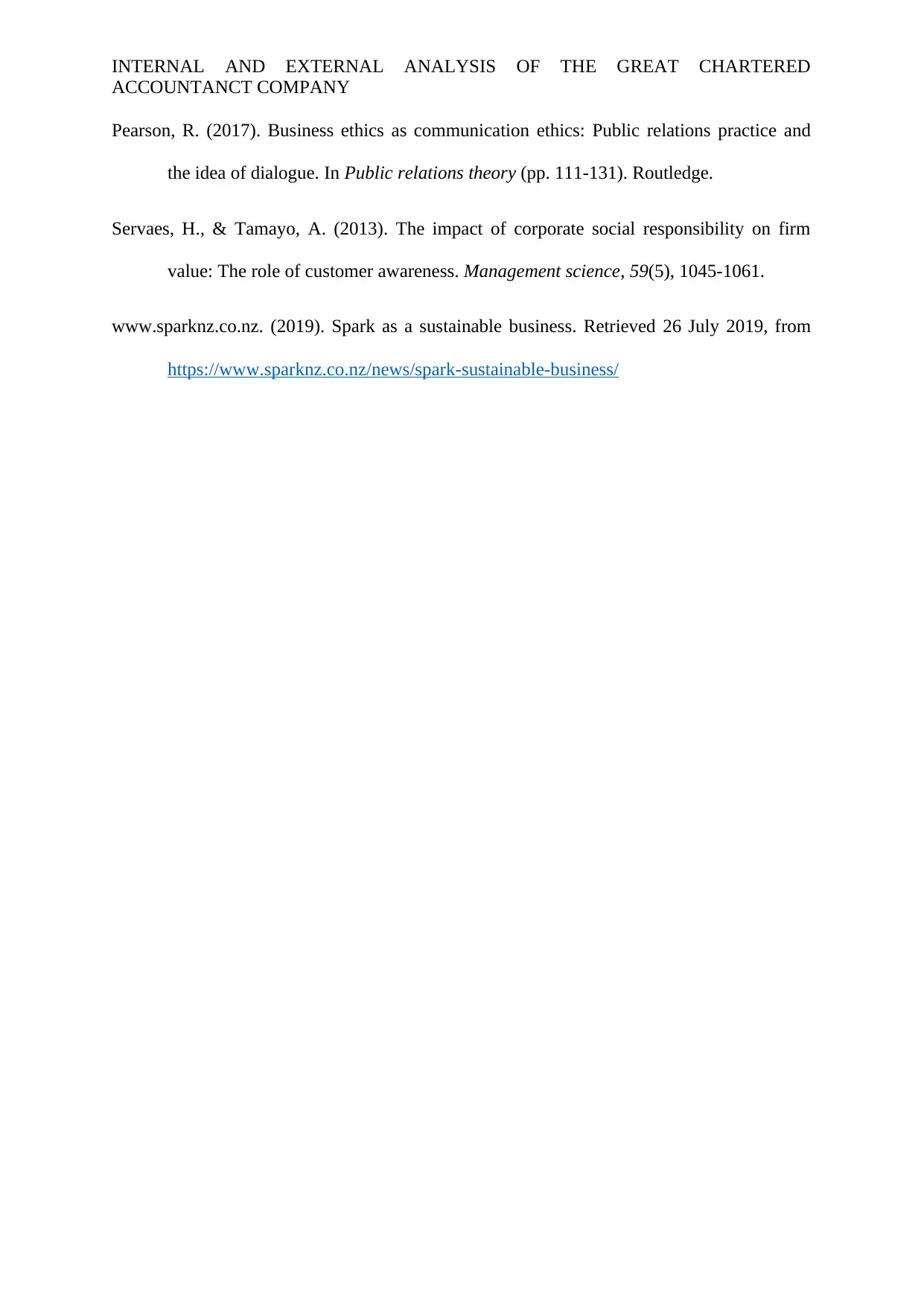
INTERNAL AND EXTERNAL ANALYSIS OF THE GREAT CHARTERED
ACCOUNTANCT COMPANY
Pearson, R. (2017). Business ethics as communication ethics: Public relations practice and
the idea of dialogue. In Public relations theory (pp. 111-131). Routledge.
Servaes, H., & Tamayo, A. (2013). The impact of corporate social responsibility on firm
value: The role of customer awareness. Management science, 59(5), 1045-1061.
www.sparknz.co.nz. (2019). Spark as a sustainable business. Retrieved 26 July 2019, from
https://www.sparknz.co.nz/news/spark-sustainable-business/
ACCOUNTANCT COMPANY
Pearson, R. (2017). Business ethics as communication ethics: Public relations practice and
the idea of dialogue. In Public relations theory (pp. 111-131). Routledge.
Servaes, H., & Tamayo, A. (2013). The impact of corporate social responsibility on firm
value: The role of customer awareness. Management science, 59(5), 1045-1061.
www.sparknz.co.nz. (2019). Spark as a sustainable business. Retrieved 26 July 2019, from
https://www.sparknz.co.nz/news/spark-sustainable-business/
1 out of 10
Related Documents
Your All-in-One AI-Powered Toolkit for Academic Success.
+13062052269
info@desklib.com
Available 24*7 on WhatsApp / Email
![[object Object]](/_next/static/media/star-bottom.7253800d.svg)
Unlock your academic potential
Copyright © 2020–2026 A2Z Services. All Rights Reserved. Developed and managed by ZUCOL.





